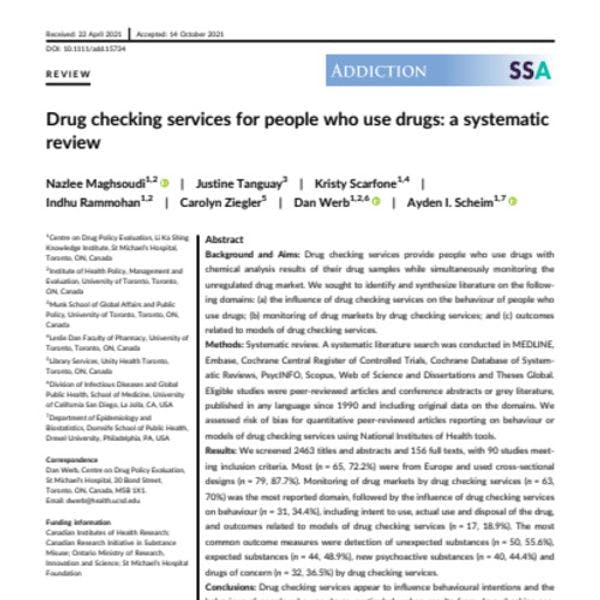Services d'analyse des drogues pour les personnes qui utilisent des drogues : Une revue systématique
Maghsoudi et al. consolident les preuves des avantages des services d'analyse des drogues en relation au changements de comportement et le suivi des marchés, soulignent les obstacles à l'accès et signalent les lacunes dans la recherche. Pour en savoir plus, en anglais, veuillez lire les informations ci-dessous.
By Nazlee Maghsoudi, Justine Tanguay, Kristy Scarfone, Indhu Rammohan, Carolyn Ziegler, Dan Werb, Ayden I. Scheim
Background and Aims: Drug checking services provide people who use drugs with chemical analysis results of their drug samples while simultaneously monitoring the unregulated drug market. We sought to identify and synthesize literature on the following domains: (a) the influence of drug checking services on the behaviour of people who use drugs; (b) monitoring of drug markets by drug checking services; and (c) outcomes related to models of drug checking services.
Methods: Systematic review. A systematic literature search was conducted in MEDLINE, Embase, Cochrane Central Register of Controlled Trials, Cochrane Database of Systematic Reviews, PsycINFO, Scopus, Web of Science and Dissertations and Theses Global. Eligible studies were peer-reviewed articles and conference abstracts or grey literature, published in any language since 1990 and including original data on the domains. We assessed risk of bias for quantitative peer-reviewed articles reporting on behaviour or models of drug checking services using National Institutes of Health tools.
Results: We screened 2463 titles and abstracts and 156 full texts, with 90 studies meeting inclusion criteria. Most (n = 65, 72.2%) were from Europe and used cross-sectional designs (n = 79, 87.7%). Monitoring of drug markets by drug checking services (n = 63, 70%) was the most reported domain, followed by the influence of drug checking services on behaviour (n = 31, 34.4%), including intent to use, actual use and disposal of the drug, and outcomes related to models of drug checking services (n = 17, 18.9%). The most common outcome measures were detection of unexpected substances (n = 50, 55.6%), expected substances (n = 44, 48.9%), new psychoactive substances (n = 40, 44.4%) and drugs of concern (n = 32, 36.5%) by drug checking services.
Conclusions: Drug checking services appear to influence behavioural intentions and the behaviour of people who use drugs, particularly when results from drug checking services are unexpected or drugs of concern. Monitoring of drug markets by drug checking services is well established in Europe, and increasingly in North America. Concerns about drug contents and negative health consequences facilitate the use of drug checking services; lack of concern; trust in drug sellers; lack of accessibility of drug checking services; and legal and privacy concerns are barriers to use.
